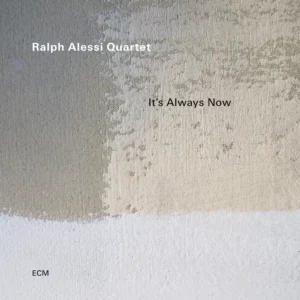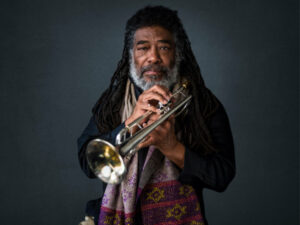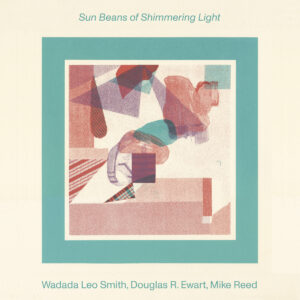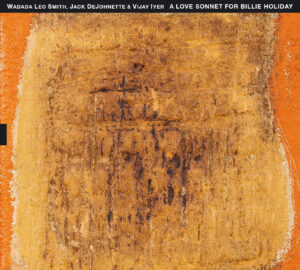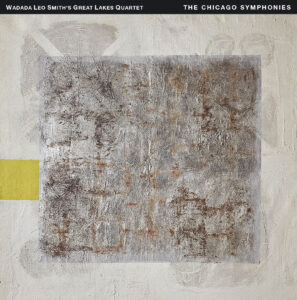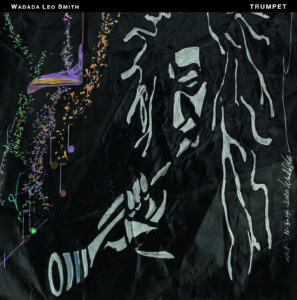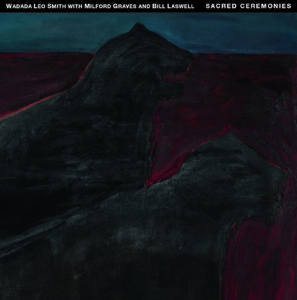Ralph Alessi Quartet
It’s Always Now
ECM CD
Trumpeter Ralph Alessi brought a passel of originals to his latest recording date, his fourth for ECM, It’s Always Now. Most are single-author compositions, but a few are collaborations with pianist Florian Weber. The two are joined on the recording by double bassist Bänz Oester and drummer Gerry Hemingway. It is a formidable lineup, one responsive to and supportive of each others’ playing.
Coauthored with Weber, “Hypnagogic” opens the album, with whole-tone arpeggiations from Weber and repeating notes from Alessi creating a mysterious atmosphere. Alessi’s lines unfurl into passages morphing the scale patterns Weber uses, imitating elements of his intro and exploring upper register sostenuto. It is a beguiling way to begin. “Old Baby’s” loping tempo and bluesy cast alludes to jazz styles past. Still, the player’s keep these tropes within their own modern language. Oester and Hemingway assert themselves on “Residue,” creating a powerful sound and corruscating rhythms. The solos are correspondingly boisterous.
“The Shadow Side” is an appropriately named mysterious ballad with wide ranging solos from both Alessi and Weber. The title tune, coauthored with Weber, features Alessi playing in the upper register with exquisite control. Slow, soft, inside-the-piano work and thick chords create complex textures. “Diagonal Lady” begins with Oester playing a fine solo with terse melodies and glissandos. It concludes with arco low notes. Alessi explores an anapestic cry and Weber ghosts his melodies.
“Everything Mirrors Everything” is a nice change of pace, literally. It begins with an uptempo moto perpetuo. The solos maintain a bebop tempo, Alessi using a mute and firing off line after line in fiery fashion. At the tune’s conclusion, he references the moto perpetuo line and Hemingway’s cymbal’s sizzle away. Short and sassy, “Ire” has a duet of its tart tune by Alessi and Weber, which is then taken out of phase by the duo, Weber adding stabbing comping.
Two extended outings, “His Hopes, His Fears, His Tears,” and “Hanging by a Thread” show the capacity of the quartet to develop small pieces of initial material into larger forms. Here as elsewhere, the simpatico interaction between Alessi and Weber is formidable. Likewise, the interactions between Oester and Hemingway never fail to impress. Hemingway has long been a favorite of mine, and hearing Oester’s lines curl around the pulse the drummer sets down, moving into his own line of syncopations to add another rhythmic layer, is a highlight of both tunes. Weber’s solo on “His Hopes… presents virtuosity in full flourish. “Hanging by a Thread” is another tune where a chromatic melody outlines an uptempo pulse. Alessi begins and is joined by Weber in a follow the leader duo. After the intro, the pace slows, and Weber takes a solo set of variations of the tune. Alessi sequences the tune in his solo and overblows stentorian high notes. He is joined by Weber and the tempo picks up to a rapid pace, florid lines breathlessly flowing. Glissandos from the trumpet heralds a new section and the rest of the quartet plays a vigorous ostinato. Alessi locks in with the patterning of the others, Weber returning to with the chromatic tune, and then Alessi repeating it one more time to conclude.
The recording’s last cut, “Tumbleweed,” another authorial collaboration with Weber, has a delicate melody built of latticed repeating cells. As in the past, Alessi and Weber trade angular lines, the trumpeter’s tone plummy in contrast to the silvery sound he often evokes. Rather than explore all of the tune’s potential, it finishes after a tantalizing three minutes.
It’s Always Now is one of my favorite recordings thus far in 2023. Recommended.
-Christian Carey
